Book contents
- Frontmatter
- Contents
- List of Abbreviations
- Acknowledgments
- 1 Poverty, Economic Development, and International Trade
- 2 Current Regulatory Framework for International Trade: The WTO System
- 3 Reclaiming Development: Tariff Bindings and Subsidies
- 4 Anti-Dumping and Safeguards
- 5 “Expansion” of Trade Disciplines and Development
- 6 Foreign Direct Investment and Regional Trade Liberalization
- 7 Conclusion: Putting Back the Ladder
- Epilogue
- Bibliography
- Index
3 - Reclaiming Development: Tariff Bindings and Subsidies
Published online by Cambridge University Press: 18 August 2009
- Frontmatter
- Contents
- List of Abbreviations
- Acknowledgments
- 1 Poverty, Economic Development, and International Trade
- 2 Current Regulatory Framework for International Trade: The WTO System
- 3 Reclaiming Development: Tariff Bindings and Subsidies
- 4 Anti-Dumping and Safeguards
- 5 “Expansion” of Trade Disciplines and Development
- 6 Foreign Direct Investment and Regional Trade Liberalization
- 7 Conclusion: Putting Back the Ladder
- Epilogue
- Bibliography
- Index
Summary
Two Principal Components of Industrial Promotion Policies
Introduction
I have discussed in the preceding two chapters the idea that the international trading system needs to allow developing countries to adopt effective development policies. What specifically are these policies, and how effective are they for economic development? Throughout history, nations have applied various policies to promote industries. Government policies targeting promotion of domestic industries are called “industrial policy.” To promote industries, governments have used a range of policy tools that include direct financial grants, loan guarantees, tax rebates/reductions, research and development (R&D) support, facilitation of social infrastructure, and various trade measures to protect domestic industries from imports.
In particular, trade measures and subsidies have historically been the two principal components of national industrial policies to promote industries, particularly in the earlier stages of their development (“infant industry promotion”). However, many economists today argue that policies using trade measures and government subsidies to promote industries are not effective and cause a distortion of resource allocation and economic inefficiencies. It is, therefore, necessary to consider the viability of these industrial promotion policies and then discuss how tariffs and subsidies are treated under the WTO. I also propose alternative provisions concerning binding tariff rates and subsidies later in this chapter, which would better facilitate economic development.
“Invisible Hand” versus Infant Industry Promotion
There has long been debate about whether governments should lead economic development or whether they should refrain from doing so because an economy performs most efficiently when it is left to the “invisible hand” of market forces.
- Type
- Chapter
- Information
- Reclaiming Development in the World Trading System , pp. 49 - 81Publisher: Cambridge University PressPrint publication year: 2006



